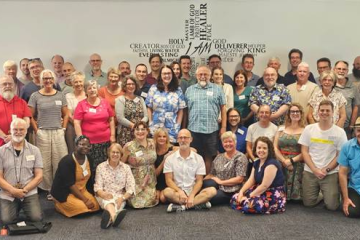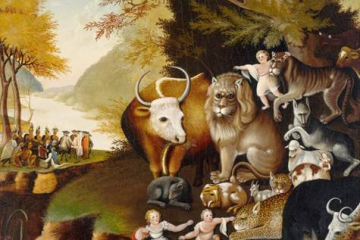For the Spirit of God beside/in/through us – John 14:8-17,25-27
A few weeks ago, we went to a friend’s 50th birthday and when it came time for speeches she told us a story – a story famously told by Russell Conwell, an American Baptist minister in the late 19th, early 20th centuries, which he, in turn he says, heard from an Arab guide while travelling along the Tigris and Euphrates rivers.
The story is about a man, of Persian background, named Ali Hafed, who owned a farm in south-central India. He was a wealthy man, and a contented man, until one night a travelling Buddhist priest told him about diamonds, how they are formed and how valuable they are. They are like ‘congealed drops of sunlight’ the monk said.
Hafed became obsessed with the idea of finding diamonds and becoming fabulously rich, so he sold his farm to a neighbour, left his family in his care, and travelled the world in search of diamonds until all his money was gone. Finally, broke, broken and heart-broken, he decided to end his life and drowned himself.
Conwell comments that here his Arab guide stopped, and went to assist another camel driver, and he thought, “What is the point of this story? It’s the first story I have ever heard in which the hero is killed in the first chapter!” You, too, might be wondering where this sermon is going! But then the guide came back, and the story continued.
One day the man who had purchased Ali Hafed’s farm took his camel to the river to drink, and as his camel put his nose into the water, the man saw something glinting in the sand. He picked up a brightly coloured stone and took it home and put it on his mantelpiece. A few days later the monk, now an old man, visited again and seeing the stone was astonished. “This is a diamond! Where did it come from? Has Ali Hafed returned?”
“No,” said the man. “This is from the river on this farm.” And this is how the Golconda diamond region was discovered, a region that has produced some of the world’s most famous diamonds; the Koh-i-Noor, the blue Hope, and the white Regent and Orlov of the crown jewels of France and Russia. Had Ali Hafed stayed at home and dug in his own garden, instead of travelling to and despairing and dying in a distant land, he would have had ‘acres of diamonds’.
The obvious moral is that sometimes what you are looking for – what you desire most – the treasure you seek – is right in front of you. Which is what Jesus says to Phillip, when Phillip says, ‘Show us the Father and we will be satisfied.’ “Have I not been with you all this time, Phillip, and you still do not know me? Whoever has seen me has seen the Father…”
It is tempting to shake our heads at the obtuseness of the disciples, and read back into this passage our understanding, shaped by centuries of doing theology, of the Trinity; that God is one God existing in three persons; Father, Son and Holy Spirit. But in this passage Jesus is not necessarily referring to an ontological oneness, but to the very special, very intimate relationship he shared with the Father, where the Father’s character and will was the source of Jesus’ inspiration and authority, but where Jesus subordinated himself to the Father.
God is with Jesus. God is in Jesus. God is working through Jesus.
“And if you do not believe me, Phillip,” Jesus says, “that hearing me is hearing God’s words, that seeing me is seeing God at work, that knowing me is knowing God, then look at the evidence – look at what God with me, God in me, God working through me – does! Believe me because of the works themselves.” I am reminded of the response Jesus gave to John the Baptist when he sent messengers to ask if Jesus was really the Messiah, “The blind receive their sight, the lame walk, the lepers are cleansed, the deaf hear, the dead are raised, and the poor have good news brought to them. The work of God is being done through me.”
But in this passage Jesus is also saying goodbye to his disciples. He is preparing them for the time when he will not be with them. So perhaps Phillip is not only asking, “Show us the Father,” but, “Show us how we keep going – keep doing your work – when you are gone!”
And again, Jesus tells them that the treasure they seek is right there with them. If they keep loving Jesus, if they keep obeying his command to love, that special and intimate (and inspiring and empowering) relationship Jesus shared with God will extend to them (to us!); God will be with us, God will be in us, God will work through us – through the Holy Spirit.
The first promise is that the Spirit or Advocate now abides with us. Verse 16: “I will ask the Father, and he will give you another Advocate, to be with you forever.” Verse 18: “You know him, because he abides with you…”
This word ‘Advocate’, parakeltos in Greek, appears five times in the New Testament – four of those five times in this farewell passage – and has a legal overtone of one who is called to be a witness for someone, or to plead their case, or to give advice in a difficult situation. “Always,” William Barclay comments, “a parakeltos is someone called in to help when the person who calls…is in trouble or distress or doubt or bewilderment.” Older translations use Comforter – you may have heard the Holy Spirit called the Comforter – because the original meaning of ‘comfort’ was ‘to make people brave’ (‘comfort’ comes from the Latin fortis, brave). Yes, the Holy Spirit comforts us, but also the Holy Spirit emboldens us!
Jesus tells his disciples that they now – we now – have two helpers. He will always be advocating for us and we have another Advocate who comes alongside us to encourage us and to ‘courage’ us – to stir us up – for the work of love God calls us to.
Secondly, we are told that not only will the Spirit be with us, but just as Jesus was in the Father and the Father was in Jesus, the Spirit, verse 17, “will be in you”. G. H. Morling, the Australian Baptist minister, writes in his study on the Holy Spirit, “Surely it awes us to consider that God the Holy Spirit enters our inmost heart. And surely it moves us deeply to know that in the secrecy of the inmost heart we may share with [God] our loneliness, our troubles, our confessions, our longing.”
The Holy Spirit’s coming in John’s gospel – “Jesus breathed on them and said to them, ‘Receive the Holy Spirit.’” – is a much quieter, more intimate Pentecost than the one in Acts, with the sound of a violent wind, tongues of fire and people proclaiming God’s deeds of power in different languages. G.H. Morling describes a time in his student days when he began to seriously seek the Holy Spirit – like the man who desired diamonds. He expected that at some time he would have a spectacular divine visitation, one that would bring a sudden success to his ministry and attract notice. “I did not have a divine visitation of that spectacular kind,” he writes, “but I did have a nervous breakdown because of the intense inner strain.”
But then a friend shared with him some teaching he had heard – treasure that was right in front of Morling – that the Spirit of God works firstly on our lives, then the Spirit works in our lives, and finally the Spirit works through our lives. As it says in John 7:38, “Out of the believer’s heart shall flow rivers of living water.”
For finally, the promise is that the Holy Spirit enables us to keep doing the works of Jesus. “The one who believes in me,” Jesus says, “will also do the works that I do, and in fact, will do greater works than these, because I am going to the Father.” And this is the story of the Christian church that although we know how in many places and many times it has failed, we also know that in many places and many times God’s people have done Jesus’ work of love and loving and liberation and justice, and that we are called to keep doing this work.
And we have so much help! We have a God who shows us love. We have Jesus who promises to do anything we ask in the name of love. We have the Holy Spirit with us, in us and working through us.
Going back to my friend’s 50th birthday, at the beginning of the night – when we arrived – we were asked to identify if we were a camel, a monk or a diamond – we had to wear sticky labels saying which – and I spent the night in some trepidation that we would eventually have to play some game! But let me ask you – do you identify most with being a camel – or a monk – or a diamond? Hands up if you are…
What my friend said at the end of her speech – and I am going to adapt it for my sermon – is that if you are the camel, you are the kind of person who gets out there in the world and does stuff! You are prepared to stick your neck out, to be an advocate for others, to come alongside them – just as the Spirit comes alongside us. You do brave things, and, in the process, you discover the unimaginable.
If you are the monk, people rely on you to share their thoughts, ideas, and feelings. Somehow, the monk recognises things that other people don’t. They’re often wise and funny and being in their presence helps people go deeper as well as turning them out toward the world.
And then there are the diamonds. At first, you may look like a lump of ordinary rock, but you are incredibly strong and resilient, and you hold that life and light and energy of God – those congealed drops of sunlight – within you so you can reflect that light back into the world. You help all of us love and transform the world around us.
But perhaps we are all a bit of all of these! Because the promise of Jesus to us that the treasure we seek is here – with us, in us, and working through us – in the strong, quiet, eternal presence of the Holy Spirit with us now.


